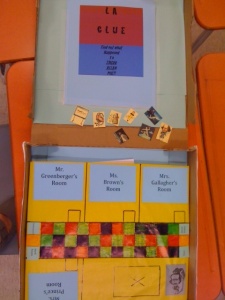Situation: You and me at a party, chatting, laughing, commiserating about whatever political fiasco is dominating the 24-hour news cycle. You ask how my classes are going this year, because you’re a nice person, and it’s polite to ask how others are doing, or so your mother told you when you were but a little thing.
I’m now torn between the truth and returning your politeness. I am taking a huge risk if I begin to complain about my work, so to anyone out there who has heard one of my many complaints, take it as a compliment, I trust you and trust that you understand me. The reason it’s a risk is because, and I’m sure every teacher has faced this retort countless times, I get summers off.
“It can’t be that bad. At least you get summers off.”
Yes, very observant person standing at this imaginary party with me, you are clearly astute, and thank you for bringing to my attention something I hadn’t considered before I began to complain.
“Oh, I hadn’t thought of that. Yes, you’re correct. Everything about teaching is fine because I get summers off.”
I know you mean no harm, but really, do you honestly think all the red tape, hoop jumping, kissing up, and other BS in my job is less stressful or upsetting or time consuming since I have summers off? It’s actually the opposite. Take your 12 months of to-do items at another job, and now condense that same list into 9 months. I don’t have less to do; I just have less time in which to accomplish it.
There are days I am certain that I’m a cartoon mouse scurrying around the building, poking my head into rooms, up and down stairs, eating while I walk. So, I thought I’d break down a fairly average day for me. I’m not going to exaggerate or squeeze in multiple high-stress situations or ludicrous incidents in order to make my point. This ordinary day for me is none of the following:
- It’s not a faculty meeting day, meaning I have to stay after school for an extra hour.
- There’s no 7:30 am teacher meeting called over the speaker at the last minute, throwing my morning routine into a tizzy.
- It’s not a parent meeting day, when a parent will come in to speak to my team and me for 40 minutes, eating up one of our planning periods.
- It’s not a high-drama day when there is a medical emergency, fire drill, tornado drill (because we do those where I teach), bomb threat (because we had one of those where I teach), stranger-in-the-building lockdown drill (because every school has those these days).
- It’s not when I’m on lunch duty, thus losing a planning period in order to monitor the Poptart intake of 300 savages (see earlier post about the cafeteria).
This is an ordinary day for me:
6:45 am: Pull out of my driveway and head to work.
7:15 am: Arrive at school 15 minutes before I have to be in the building because I want to run copies, and if you arrive any later than 7:15, you will NOT be able to make copies before first period, despite the fact that the person in line in front of you doesn’t have a first period class and could easily run copies then.
7:25 am: Go to copy room to find that the copier is jammed. Walk downstairs to find that the other copier has a line of people who want to run 2-sided packets, hole punched, and stapled…really people.
7:35 am: Finally un-jam the upstairs copier and run my copies. (Notice how I’m omitting the detail where the copier continues to jam, and despite the fact there is no paper on the paper tray, the copier believes there is and won’t continue until, exasperated, I shut it down and restart the entire mammoth contraption. Nor am I including the moment when there are no staples in the copies, so I now have to hand staple 120 packets for my students. I’m leaving out those details because I want to show an ordinary day, not my Murphy’s Law day – that’s tomorrow.)
7:45 am: Return to my room to find two students waiting for me with questions about their research. S1:“Can you read my paper?” Me: “I’ll read part of it. What part are you nervous about?” S1: “The whole thing.” S2: “If you’re going to read his, can you also read mine?”
7:50 am: Phone rings. (This could be that I have to cover another teacher’s class because that teacher is out for the day, but that’s also not part of my ordinary day. Notice how honest I’m being.) It’s the secretary telling me that the principal needs to see me for a moment to discuss the novel I’m teaching. (Unfortunately, it IS part of my day to check in with the office because someone in the main office always has a question for me.)
7:55 am: A colleague sticks her head in the door and asks about when we can meet to discuss the cross-country schedule for next fall. She has to set up meets and wants my input. I tell her that we’ll touch base after school.
8:02 am: My first period says the Pledge of Allegiance, and my day has actually started.
I teach five sections of eighth grade. In between, and sometimes during, those classes, here are other things I accomplish on an average day:
- Meet with the principal to answer his question about the novel.
- Receive email from parent who claims her daughter is having trouble taking notes and wants to know if I can help. The email chain will go something like this:
o Me: We actually don’t take notes in my class right now, and she did fine taking notes for the first 6 months of the school year.
o Parent: It’d be really helpful if you could send me your notes.
o Me: Again, I don’t have any notes. The students are writing an essay; there are no notes.
o Parent: Then why is my daughter having trouble with notes?
o Me: Sigh and no response.
- Fill in IEP paperwork for two students because that paperwork is due today, and there’s no time left to procrastinate.
- Send my homework assignment to our website coordinator, who uploads it to the school’s site.
- Upload my attachments for my homework to my own web page, including vocabulary lists and rubrics, neither of which the students will look at, and both of which they will ask for extra copies.
- Realize that a student will be out next week on a family trip and that another student has been absent for three days with an illness. Hurry to gather their materials, track down the former student to give him what he’ll miss (although he won’t do it and will be annoyed when he gets back that he’s so far behind), and take the absent student’s work to the office. Email absent student’s parents to say there is work in the office.
- Receive email from a parent who wants to know if her son did the independent reading for this grading period.
o Me: He did not.
o Parent: But he told me he did.
o Me: There is no record in the computer of your son having tried to take a test to prove he read a book independently.
o Parent: This is very alarming. Can you take him to the library so he can take that test?
o Me: No, your son is 14. If he can’t find the library, there’s no help for him. (Ok, I never send that email, but that’s what I’m thinking.)
o Parent: Can you call me? I’d like to talk about the independent reading. I don’t think he understands what he’s supposed to do. (I’ll call her tomorrow, so I’ll leave that out of my ordinary day summary.)
- Pass back graded papers in class and answer any and every question students have about it. Collect anything and everything from anyone who has ever been absent.
- Put grades for that late homework into the online grading system so that parents can see their child’s grades. (Parents either never check grades or obsessively check grades, and either way, it’s frustrating.)
- See special educator in the hallway. She asks about her students, so I spend 10 minutes relaying who did and did not turn in recent homework assignments and what tests and projects they should currently be working on. I then listen to her summarize her IEP meetings and what each parent said, even though I can’t really use this information; it’s just polite to let her vent.
- During one planning period each day, I meet with my department to talk about what we are teaching and to create lessons, handouts, tests, projects, rubrics, etc. I don’t complain about this because I like the people I work with.
My day ends with a study hall that I run as a Writing Center (this will surly be the topic of a future post). So my last 45 minutes every day consist of having students wander in and out of my room to ask questions about their writing, to work on computers, to work with other students, and any other manner of questions. After school, I’ll meet up with that teacher about cross-country. I’ll track down the teachers of students I tutor to see what they are covering in their classes and what is due when. I’ll print whatever I need for the next day. Then, I leave the building and wait to do it all again the next day.
I haven’t included any of the following in my ordinary, which, if you are not a teacher, you may not realize are part of my unspoken duties:
- Grade
- Create bulletin boards (in my building, having a current bulletin board is actually part of our formal evaluation)
- Hang student work in the hallways
- Email parents of students who are failing or missing work
- Meet with my team of core subject teachers to discuss our shared students
- Meet with my grade-level team to discuss schedule for eighth grade
- Distribute field trip permission slips; collect permission slips and money
- Coordinate with seventh grade teacher to find and train Writing Center students for next year
- Attend IEP meetings
- Attend curriculum meetings
- Answer any email any parent sends regarding any concern. I’ve included two instances above because I honestly get at least two parent emails a day, and by parent emails, I mean an online conversation that could be six or more emails back and forth to answer a single question. Most emails are benign, but believe-you-me, I’ve had some doozies too.
- Call the dentist…wait, that’s a different list, although I’ve been meaning to call my dentist for a week now and haven’t found time to do it.
But, in our imaginary, party conversation, I’ll most likely avoid telling you all this. It makes me sound bitter and like a martyr. I knew what I was signing up for when I chose to be a teacher. I’m ok, most days, with jamming all my stress into 9 months like the photocopier jams all my papers into a crumpled, hot mess. I suppose my purpose here isn’t to make you think my job is harder than other jobs, but please don’t try to convince me that it’s easier. And, if you don’t mind too much, please limit how often you use summers off as your ammo against me. I think I’ve earned that summer off.


